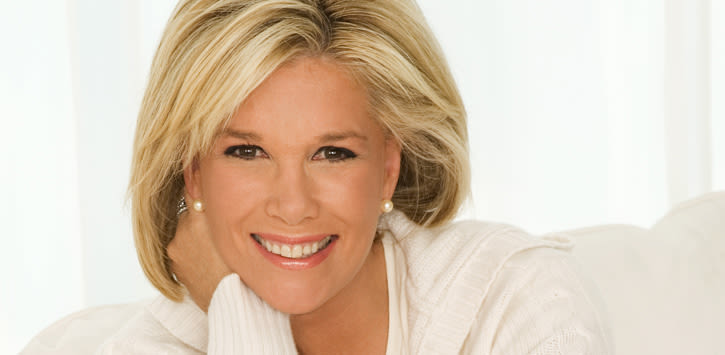Joan Lunden Shares Her Breast Cancer Story at Tidewell Hospice Luncheon

We sat down with Joan Lunden, who was in town Friday for Tidewell Hospice's Compassion in Caring luncheon, to talk about her breast cancer story.
What motivated you to share your breast cancer experience publicly?
You know, you hear those words, “You’ve got cancer,” and you’re just kind of shell-shocked. And then about two days after my diagnosis, I was going to sleep, and I thought, “Wow, my dad was a cancer surgeon.” He was also an avid private pilot, and he was flying home from speaking at a cancer convention, and he crashed and was killed at only 51 years old. I thought, “In an odd way, you just got handed an opportunity to carry on your dad’s legacy.”
And the minute I changed my focus from my cancer to the fight against breast cancer, it really changed my breast cancer journey. In a good way.
I’d go from city to city to city giving speeches, and [people would say] are you sure you’re OK to do this, and I’d say, “This is therapeutic. This is empowering.” I was handed a gift to be able to go out and educate and motivate women to understand their breast health better. I got…millions, actually…of people who came back to me on social media. Many of them were women saying, “I heard you, I went I got my mammogram. I found out that I do have a tumor, but I found it early because of you.” Every time you read one of those, it’s like, “OK, that’s why I’m here on this earth. If that’s what I’ve accomplished, then I’m good with that.”
Thinking back to the day before your diagnosis—
When I was in charge of everything? [laughs]
—to now, how has the experience changed you?
I had gone down this caregiving path with my mom. I’d always wondered, “I know how it is for us, the adult children who are taking care of parents. I wonder what it’s like for them?” To all of a sudden have their child telling them what to wear, to get up out of bed and do this and do that.
When I got my cancer diagnosis, [I’m] this type A over here, like “I don’t need any help.” Of course, my husband and my three older daughters insisted, thankfully. I was on the other side of the caregiving. And I found it to be very difficult. It was probably one of the most difficult aspects of cancer care for me was accepting people taking care of me and going along and holding my hand, like I don’t need any of this.
I think it was good, to feel what it feels like to be on the other side of it. And to understand how emotionally complex that is.
Tell us about the diagnosis.
I’d had a 3D mammogram—my doctor said to me, “It’s worth it. It’s exponentially better,” which it is—but it did not find the cancer. And I walked out of there, like “OK, another year, another clean mammo.” And then I went across the hall and had an ultrasound and I heard those words you never want to hear: “You have breast cancer.”
Why did you get the ultrasound in addition to the mammogram?
About five years earlier, I’d gone to interview Dr. Susan Love, who wrote The Breast Book. She and I were chit-chatting while they were changing batteries on the camera. And she was like, “You do get your mammograms, right Ms. Lundon?” And I was like, “Oh yeah yeah yeah, every year. But they’re always nerve-racking because they’re always calling me in for more pictures, and I’ll say 'Why, did you find something?' And they’ll say 'No, we can’t see anything because you have dense, fibrous breasts.'” And with that [Dr. Love] said, “If you have dense, fibrous breasts then you need to also be having ultrasounds.”
So because of a fluke interview, she told me to get it, and thank god I listened. I’ve spent the last year and a half educating women on finding out if they have dense breast tissue, because if they do, the mammogram might not even detect their cancer. Dense breast tissue shows up on a film as white, and cancer shows up as white. It’s kind of like looking for a snowball in a snowstorm.
Other advice?
There’s so much controversy right now over mammograms. They, are at the moment, the gold standard. Right now women are supposed to start mammograms at 40 years of age and have them every year. And the U.S. Special Preventative Services Task force has now said, “Nope, you don’t need to start until you’re 50. And do them every two years.” The reason, they say, is not enough lives are lost versus the potential of false positives and unneeded biopsies. I don’t know about you, but I’d rather have a false positive every day of the week and have it checked out rather than not find out. My question for them is, “How many women actually do have to die [to make earlier mammograms recommendable]?”
So, ladies, do your breast self-exams, know your breast, so that if you’re doing them all the time, you’ll know something’s wrong. And you start those mammograms at age 40, as far as I’m concerned.



